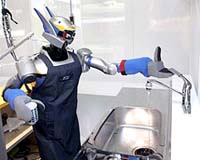TOKYO 02/03/2007
Japan's advanced humanoids can now serve tea and wash the cup afterwards, but they still need to learn from their mistakes if they are to become real household helpers.
A Tokyo University team this week showed their latest robots which can perform more complicated daily tasks, but the machines still have a learning curve.

In a model living room equipped with robotic items including two humanoids, professor Tomomasa Sato plopped himself down on the sofa, prompting a reading lamp to turn on automatically.
He then raised his hand and the HRP-2W humanoid -- wearing an apron and kitchen gloves over its metallic frame -- rolled over and asked, "Do you need help?"
"I'd like a cup of tea," Sato said.
The wheeled robot dutifully turned around and went to the kitchen counter, where a two-legged fellow humanoid grabbed a plastic bottle to pour tea into a cup.
"The focus used to be on making humanoid robots walk with two legs, but now the point is to shift one step beyond to make it do a variety of practical movements," Sato said.
"There is no script in this demonstration," he said. "These components of information systems react to my actions and create an environment to assist me."
Professor Masayuki Inaba, who heads the team that designed the humanoids, said the next challenge was to make machines that can handle unexpected situations, such as accidentally dropping a cup.
"They will need to memorize information from different situations," Inaba said. "They need to learn and expect what will happen next, making their own judgement using an accumulated memory of what causes what kind of results.
"That is an ability necessary for them to learn -- that when a wet cup slips from their hand, then they have to grab more firmly when picking up a wet container."
© 2006 AFP. All rights of reproduction and distribution reserved. All information displayed on this section (dispatches, photographs, logos) are protected by intellectual property rights owned by Agence France-Presse. As a consequence, you may not copy, reproduce, modify, transmit, publish, display or in any way commercially exploit any of the content of this section without the prior written consent of Agence France-Presse.